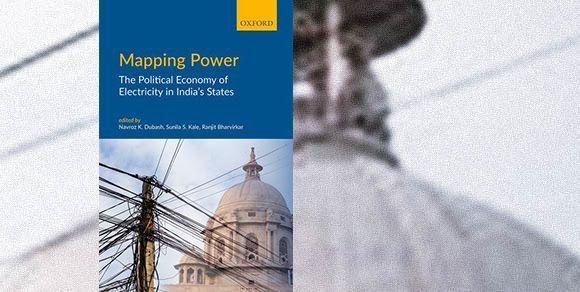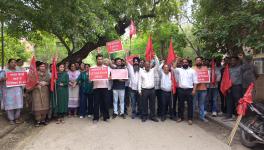New Book Says Power Reforms Must Be Linked to Electoral Politics for Success

Why have generations of power sector reforms in India — beginning in the early 1990s — failed to provide financial durability to the sector as well as electricity to all? A new book claims that it is because these reforms failed to engage with the realities of state-specific electoral politics.
Titled Mapping Power: The Political Economy of Electricity in India’s States, the book was launched on September 17 at a high-profile event in Delhi.
The launch event was attended by Union Minister Suresh Prabhu (on video), former Union Minister Jairam Ramesh, BJP national spokesperson Narendra Taneja, and former Central Electricity Regulatory Commission (CERC) Chairman Pramod Deo.
The book is an anthology of case studies of the “politics of electricity distribution” in 15 states — Andhra Pradesh, Bihar, Delhi, Gujarat, Jharkhand, Karnataka, Madhya Pradesh, Maharashtra, Odisha, Punjab, Rajasthan, Tamil Nadu, Uttar Pradesh, Uttarakhand, and West Bengal.
It has been edited by Navroz K Dubash (Professor, Centre for Policy Research), Sunila S Kale (Director, South Asia Centre at the University of Washington), and Ranjit Bharvirkar (Principal, Regulatory Assistance Project). It is published by Oxford University Press.
Speaking at the launch, Dubash said that Mapping Power attempts to understand how the power sector is shaped by and itself shapes electoral spolitics. The central thesis of the book is that successful electricity reforms in the country depend on the linkages with electoral gains.
Dubash said all electricity reform measures in the past had an impulse to insulate the power sector from politics, and that this attempt to “depoliticise” electricity is misplaced.
Despite more than two decades of reforms — including opening doors to private generation, distribution-company reforms, regulatory reforms, and the Electricity Act, 2003 that sought to restructure the sector into competitive market structure — the sector remains besieged with financial losses and indebtedness, and is unable to provide universal electricity, the book says.
Dubash said electricity reforms would succeed only if and when they provide “greater political payoffs than the status quo”.
Jairam Ramesh agreed that power reforms were inherently political decisions and that they were “less a technocratic process and more a political process.” He said one could not have “cookie-cutter approach to power sector reforms in which you treat all states as identical cases.”
Taneja made the point that “complete decentralisation” of electricity distribution was the “only way forward”, and that it would increase consumer participation across the grid. He also pushed the idea of setting up “solar republics” at the local level, even at village level — which have “nothing to do with Delhi” and have local participation.
“We need to set up lakhs of solar republics in India — republics with their own regulation, their own tariffs… Let the Kanpur tariff rate be completely different from that of Lucknow or Agra,” said Taneja.
The need to restructure the architecture of the energy sector and the need to raise domestic and industrial rates of electricity consumption were also discussed at the event.
The launch was followed by a technical panel discussion with Professor DV Ramana from Xavier Institute of Management, Bhubaneshwar; Aditi Phadnis, political editor, Business Standard; and Shantanu Dixit, the group coordinator of Prayas (Energy Group). The panelists discussed regulatory reforms, subsidies, and governance issues in the power sector.
However, throughout the launch event and panel discussion that followed, there was no mention of how the reforms, particularly the Electricity Act, 2003, have led to the current crisis. The 2003 Act followed the World Bank-promoted model of “unbundling” and trifurcated the state electricity boards into generation, transmission and distribution — so that private companies could enter the safer and more profitable aspects, such as generation. Only Kerala and Himachal Pradesh continue to have integrated state electricity boards. Further, the 2003 Act introduced “delicensing” for thermal power production, which is largely responsible for the current non-performing assets (NPA) crisis. Following this, a massive number of private companies entered generation, which have now burdened the Indian banks with NPAs of more than Rs 1.74 lakh crore, and this crisis cannot be resolved without reversing the reforms.
While there was mention of the Electricity (Amendment) Bill, there was no mention of how and why the Bill is being opposed by power employees across the country. The Bill seeks to segregate carriage and content in power distribution, so that the state lays down the wires and private companies compete over selling the power to consumers (there will be one government agency, presumably for less profitable consumers). But, this will not only compromise the right to electricity of the poor — in a country where nearly 30 crore people do not have access to electricity — but would likely lead to a situation where all consumers would have to pay higher or suffer erratic supply.
Get the latest reports & analysis with people's perspective on Protests, movements & deep analytical videos, discussions of the current affairs in your Telegram app. Subscribe to NewsClick's Telegram channel & get Real-Time updates on stories, as they get published on our website.
























